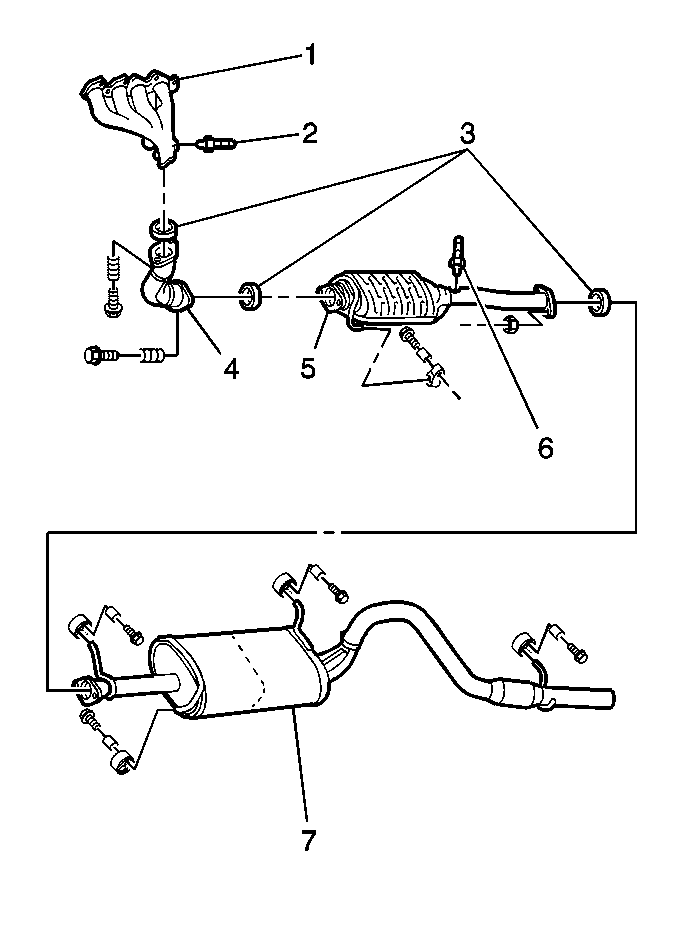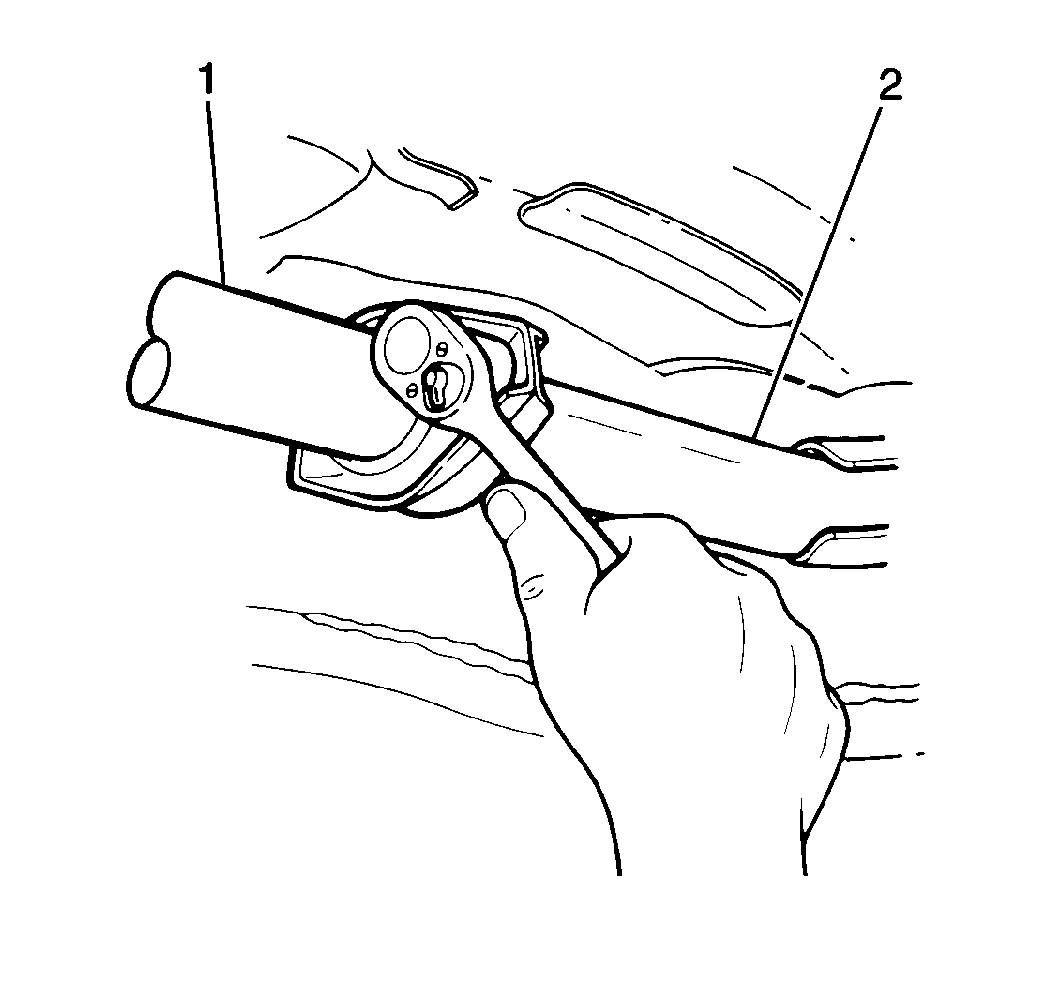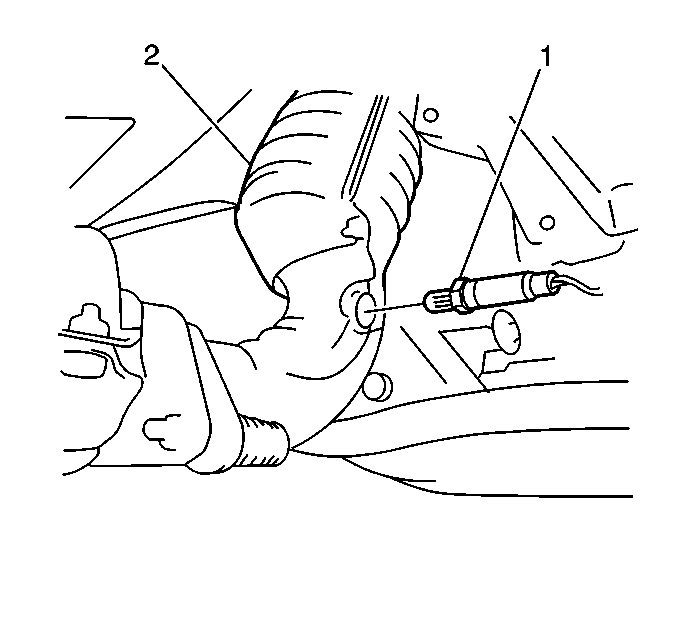Catalytic Converter Replacement Standard Converter 1.6L
Removal Procedure
- Raise and support the vehicle. Refer to Lifting and Jacking the Vehicle in General Information.
- Remove the two bolts from the front pipe assembly and separate the front pipe from the catalytic converter assembly (5).
- Remove the electrical connector at the heated oxygen sensor (H02S2) (6).
- Remove the two nuts from the catalytic converter assembly (1) and separate from the resonator/muffler/tail pipe assembly (2).
- Remove the hanger supporting the catalytic converter assembly.
- Remove the catalytic converter assembly from the vehicle.
- Clean the gasket and the seal mating surfaces.


Installation Procedure
- Install the catalytic converter assembly (5) to the vehicle.
- Support the catalytic converter assembly with a hanger.
- Attach the catalytic converter assembly with a new gasket to the resonator/muffler/tail pipe assembly (7).
- Secure the resonator/muffler/tail pipe assembly with two nuts. Do not fully tighten the nuts.
- Attach the electrical connector to the heated oxygen sensor (H02S2) (6).
- Use a new seal, and connect the front pipe to the catalytic converter assembly and secure with two bolts. Do not fully tighten the bolts.
- Align all system components before tightening the fasteners, in order to prevent noise or vibrations.
- Lower the vehicle.
Important: When installing a new exhaust system component, always use new gaskets and seals.

Notice: Use the correct fastener in the correct location. Replacement fasteners must be the correct part number for that application. Fasteners requiring replacement or fasteners requiring the use of thread locking compound or sealant are identified in the service procedure. Do not use paints, lubricants, or corrosion inhibitors on fasteners or fastener joint surfaces unless specified. These coatings affect fastener torque and joint clamping force and may damage the fastener. Use the correct tightening sequence and specifications when installing fasteners in order to avoid damage to parts and systems.
Tighten
| • | Tighten the front pipe to catalytic converter assembly bolts to 50 N·m (37 lb ft). |
| • | Tighten the catalytic converter to resonator/muffler/tail pipe assembly nuts to 35 N·m (26 lb ft). |
Catalytic Converter Replacement PUP Converter 1.6L
Removal Procedure
- Raise and support the vehicle. Refer to Lifting and Jacking the Vehicle in General Information.
- Remove the electrical connector at the heated oxygen sensor (H02S1) (1).
- Remove the two bolts from the PUP catalytic converter and separate the PUP (2) from the standard catalytic converter assembly.
- Remove the three nuts from the flange of the PUP catalytic converter (1) and separate from the exhaust manifold.
- Remove the PUP catalytic converter from the vehicle.
- Clean the gasket and the seal mating surfaces.

Installation Procedure
- Install the PUP catalytic converter (2) to the exhaust manifold.
- Secure the PUP catalytic converter with three nuts. Do not fully tighten the nuts.
- Attach the PUP catalytic converter with a new gasket to the standard catalytic converter assembly.
- Secure the PUP catalytic converter with two bolts. Do not fully tighten the bolts.
- Attach the electrical connector to the heated oxygen sensor (H02S1) (1).
- Align all system components before tightening the fasteners, in order to prevent noise or vibrations.
- Lower the vehicle.
Important: When installing a new exhaust system component, always use new gaskets and seals.

Notice: Use the correct fastener in the correct location. Replacement fasteners must be the correct part number for that application. Fasteners requiring replacement or fasteners requiring the use of thread locking compound or sealant are identified in the service procedure. Do not use paints, lubricants, or corrosion inhibitors on fasteners or fastener joint surfaces unless specified. These coatings affect fastener torque and joint clamping force and may damage the fastener. Use the correct tightening sequence and specifications when installing fasteners in order to avoid damage to parts and systems.
Tighten
| • | Tighten the PUP catalytic converter to standard catalytic converter assembly bolts to 50 N·m (37 lb ft). |
| • | Tighten the PUP catalytic converter to exhaust manifold nuts to 50 N·m (37 lb ft). |
Catalytic Converter Replacement Standard Converter 2.0L
Removal Procedure
- Raise and support the vehicle. Refer to Lifting and Jacking the Vehicle in General Information.
- Remove the two bolts from the front pipe assembly and separate the front pipe from the catalytic converter assembly (5).
- Remove the electrical connector at the heated oxygen sensor (H02S2) (6).
- Remove the two nuts from the catalytic converter assembly (1) and separate from the resonator/muffler/tail pipe assembly (2).
- Remove the hanger supporting the catalytic converter assembly.
- Remove the catalytic converter assembly from the vehicle.
- Clean the gasket and the seal mating surfaces.


Installation Procedure
- Install the catalytic converter assembly (5) to the vehicle.
- Support the catalytic converter assembly with a hanger.
- Attach the catalytic converter assembly with a new gasket to the resonator/muffler/tail pipe assembly (7).
- Secure the resonator/muffler/tail pipe assembly with two nuts. Do not fully tighten the nuts.
- Attach the electrical connector to the heated oxygen sensor (H02S2) (6).
- Use a new seal, and connect the front pipe to the catalytic converter assembly and secure with two bolts. Do not fully tighten the bolts.
- Align all system components before tightening the fasteners, in order to prevent noise or vibrations.
- Lower the vehicle.
Important: When installing a new exhaust system component, always use new gaskets and seals.

Notice: Use the correct fastener in the correct location. Replacement fasteners must be the correct part number for that application. Fasteners requiring replacement or fasteners requiring the use of thread locking compound or sealant are identified in the service procedure. Do not use paints, lubricants, or corrosion inhibitors on fasteners or fastener joint surfaces unless specified. These coatings affect fastener torque and joint clamping force and may damage the fastener. Use the correct tightening sequence and specifications when installing fasteners in order to avoid damage to parts and systems.
Tighten
| • | Tighten the front pipe to catalytic converter assembly bolts to 50 N·m (37 lb ft). |
| • | Tighten the catalytic converter to resonator/muffler/tail pipe assembly nuts to 35 N·m (26 lb ft). |
Catalytic Converter Replacement PUP Converter 2.0L
Removal Procedure
- Raise and support the vehicle. Refer to Lifting and Jacking the Vehicle in General Information.
- Remove the electrical connector at the heated oxygen sensor (H02S1) (1).
- Remove the two bolts from the PUP catalytic converter and separate the PUP (2) from the standard catalytic converter assembly.
- Remove the three nuts from the flange of the PUP catalytic converter (1) and separate from the exhaust manifold.
- Remove the PUP catalytic converter from the vehicle.
- Clean the gasket and the seal mating surfaces.

Installation Procedure
- Install the PUP catalytic converter (2) to the exhaust manifold.
- Secure the PUP catalytic converter with three nuts. Do not fully tighten the nuts.
- Attach the PUP catalytic converter with a new gasket to the standard catalytic converter assembly.
- Secure the PUP catalytic converter with two bolts. Do not fully tighten the bolts.
- Attach the electrical connector to the heated oxygen sensor (H02S1) (1).
- Align all system components before tightening the fasteners, in order to prevent noise or vibrations.
- Lower the vehicle.
Important: When installing a new exhaust system component, always use new gaskets and seals.

Notice: Use the correct fastener in the correct location. Replacement fasteners must be the correct part number for that application. Fasteners requiring replacement or fasteners requiring the use of thread locking compound or sealant are identified in the service procedure. Do not use paints, lubricants, or corrosion inhibitors on fasteners or fastener joint surfaces unless specified. These coatings affect fastener torque and joint clamping force and may damage the fastener. Use the correct tightening sequence and specifications when installing fasteners in order to avoid damage to parts and systems.
Tighten
| • | Tighten the PUP catalytic converter to standard catalytic converter assembly bolts to 50 N·m (37 lb ft). |
| • | Tighten the PUP catalytic converter to exhaust manifold nuts to 50 N·m (37 lb ft). |
